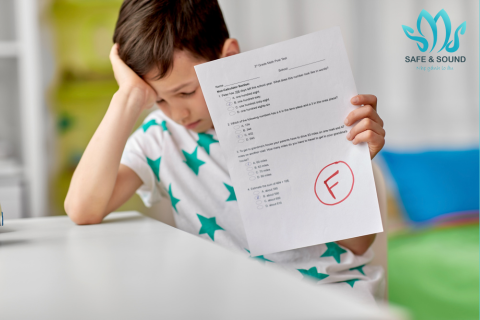Depression in High School Students: Early Warning Signs Parents Should Not Ignore | Safe and Sound
In high school, students face many changes and pressures: from studying, exams, social relationships to psychological fluctuations. If these factors are not well controlled, they can lead to depression - a serious mental disorder that many people still take lightly. According to psychologists, early detection of signs of depression is a key factor in preventing unfortunate consequences and helping students recover quickly.
Phi Thuy Linh | Bachelor of Public Health – Mental Health Care Application Safe and Sound
Institute of Medical Technology Applications
1. Why are high school students prone to depression?

High school students often face many pressures and changes in their bodies, leading to emotional vulnerability.
High school is a pivotal period in a person's development. Students have to deal with high demands from school, expectations from parents, and deal with the psychological changes of puberty. Psychologists say that this complex transition makes students emotionally vulnerable and prone to depression if not properly guided and supported.
Some common causes of depression in high school students include:
- The pressure of studying and taking exams is too great.
- Conflict in relationships with friends, teachers or family
- Lack of emotional management skills
- Being bullied at school or socially isolated
- Negative self-comparison on social media
- Family history of mental disorders or depression
Psychologists warn that many cases of students suffering from depression go undetected and are even misunderstood as "rebellious", "lazy" or "stubborn". This makes the depression worse silently and more difficult to treat.
2. Early signs that parents need to pay special attention to
Early detection of depression in students is very important, but not always easy. According to psychologists, signs of depression are often not obvious but develop slowly, requiring careful observation from family and teachers. Below are some alarming signs:
2.1. Prolonged emotional changes
- Often sad, melancholy for no apparent reason.
- Loss of interest in things you once enjoyed.
- Crying easily, irritable or unusually quiet.
Psychologists say if a student maintains a negative mental state for at least two consecutive weeks, it could be an early sign of depression.
2.2. Sleep and eating disorders
- Insomnia or sleeping too much.
- Eating less, losing appetite, or overeating without control.
- Often complain of fatigue and lack of energy.
Psychologists warn that sudden changes in routine are clear warning signs that need to be addressed by parents.
2.3. Self-isolation
- Avoid communication with relatives and friends.
- Not wanting to go to school, or taking time off without reason.
- Quiet, limited participation in extracurricular activities.
Psychologists emphasize that the tendency to withdraw socially is a typical manifestation of school-age depression.
2.4. Decline in academic performance

Academic performance decline is a consequence of prolonged emotional and anxiety disorders.
- Lack of concentration, often forgetting lessons.
- Academic performance declined abnormally.
- Not completing homework, lack of motivation to study.
Parents often mistake this condition for laziness. However, psychologists explain that it is a result of the brain being affected by emotional and anxiety disorders.
2.5. Having negative thoughts about yourself and life
- Low self-esteem, thinking of oneself as a burden on the family.
- Or blame yourself, feel useless.
- Have thoughts of death or self-harm.
If a student exhibits any thoughts or statements related to ending his or her life, psychologists recommend that the family seek immediate medical attention.
3. What should parents do when they suspect their child has signs of depression?
3.1. Listen and accompany without judgment
First, parents need to create a safe environment where their children feel they can share their feelings without being criticized. Psychologists advise parents to listen with empathy and genuine concern instead of giving stereotypical advice.
3.2. Do not add pressure
Avoid comparing your child to others or pressuring them to achieve. Acknowledge their feelings and support them in their journey to overcome difficulties. Psychologists emphasize that pressure from parents can be the “last straw” that causes students to fall into a more serious psychological crisis.
3.3. Encourage your child to maintain healthy living habits
- Eat nutritious food.
- Get enough sleep, on time.
- Increase physical activity and outdoor activities.
- Limit time spent on social media.
Psychologists say that maintaining a scientific lifestyle significantly improves mood in people with depression.
3.4. See a psychologist as soon as possible
This is a very important step. Depression is a treatable disorder if detected and treated promptly. A psychologist will assess the severity of depression and suggest appropriate treatment such as individual counseling, cognitive behavioral therapy, or combined medical treatment if necessary.
.png)
4. The role of schools and communities in preventing school depression
Not only family, school also plays an important role in preventing and early detecting depression in high school students.
4.1. Set up a school counseling room
Schools should have school psychologists or link with psychological support organizations so that students have a trusted place to share their difficulties.
4.2. Organizing life skills education activities
Practicing skills in emotional management, effective communication, overcoming pressure, etc. will help students cope better with challenges. Psychologists can directly participate in teaching or training skills for students and teachers.
4.3. Strengthening the connection between school - family - psychologist
Only with close coordination between the three parties can support for depressed students be effective and comprehensive.
Depression in high school students is a serious problem but can be prevented and treated if detected in time. Parents are the first to detect it in protecting their children's mental health. The smallest manifestations in their children's behavior and emotions can be warning signs worth paying attention to.
If you feel your child is showing signs of depression, don't delay. Talk to your child and contact a mental health professional immediately for early intervention guidance. 
Safe and Sound Clinic - Family health and psychological support
With a team of experienced doctors and specialists, Safe and Sound Clinic is a pioneer in comprehensive health care with health care services from medicine to psychology.
“Early prevention - Timely support - Long-term companionship”.
If you have any doubts or experience any physical or mental health problems, please contact HOTLINE 0964 778 911 (Phone/Zalo, 24/7) for answers and support as soon as possible!
HOW TO MAKE AN APPOINTMENT for online or in-person consultation with an expert
- At SnS Clinic - IMT Institute
- Or download and schedule a consultation on the Safe and Sound app to manage and track your schedule anytime, anywhere.
Safe and Sound (SnS) - Institute of Applied Medical Technology (IMT)
See also:
Student Suicide - What Needs to Change in Schools?
Are irritable and hot-tempered children signs of mental illness?
Recognizing bipolar disorder in children and adolescents



